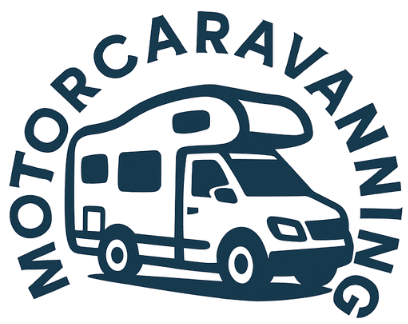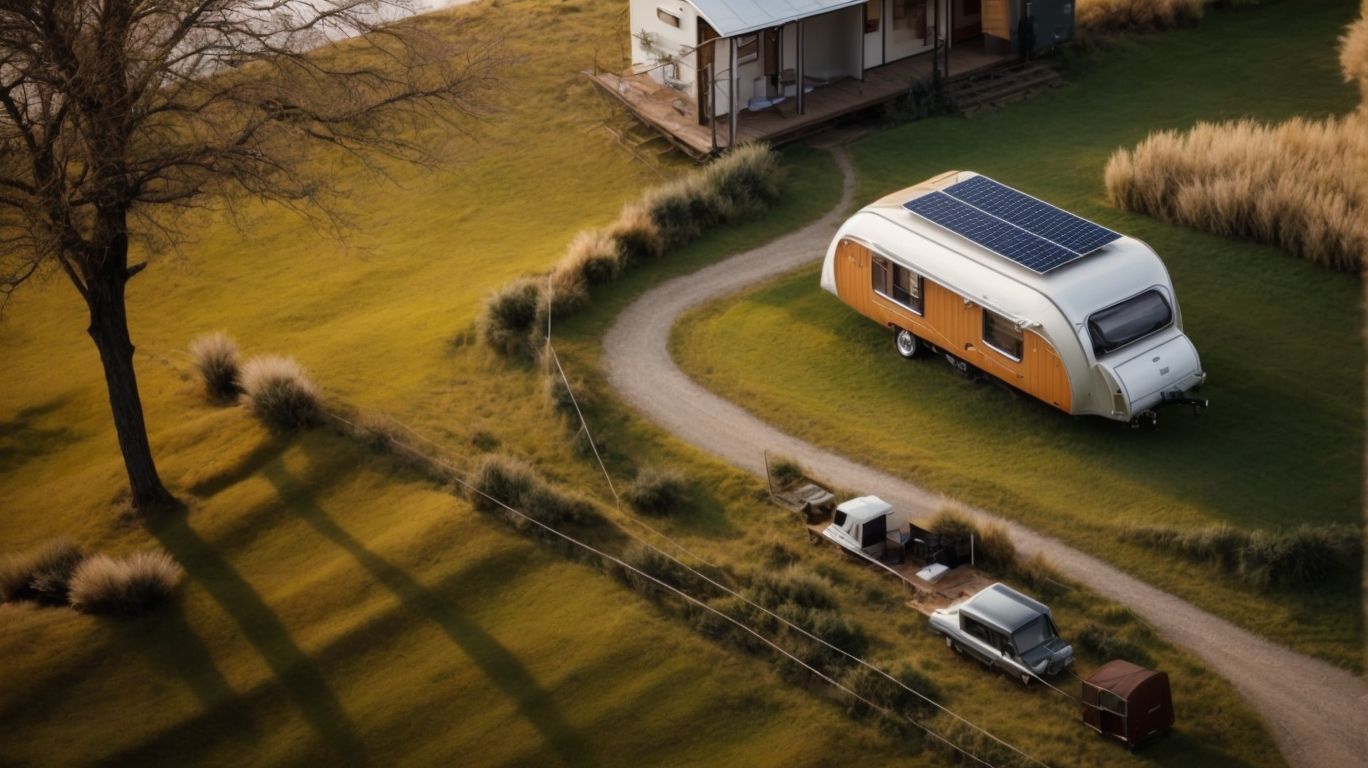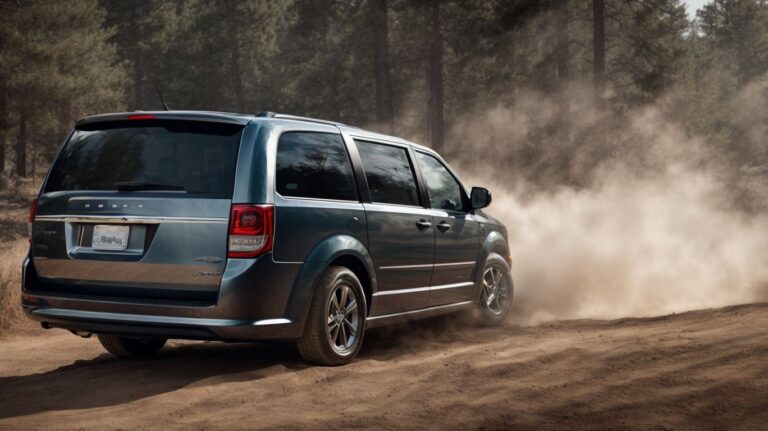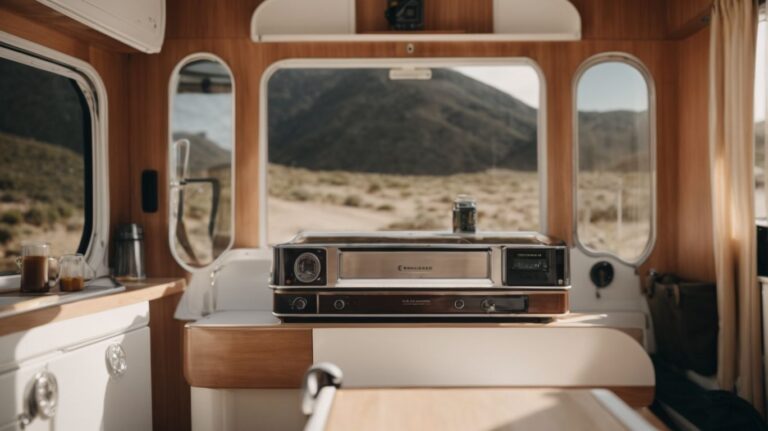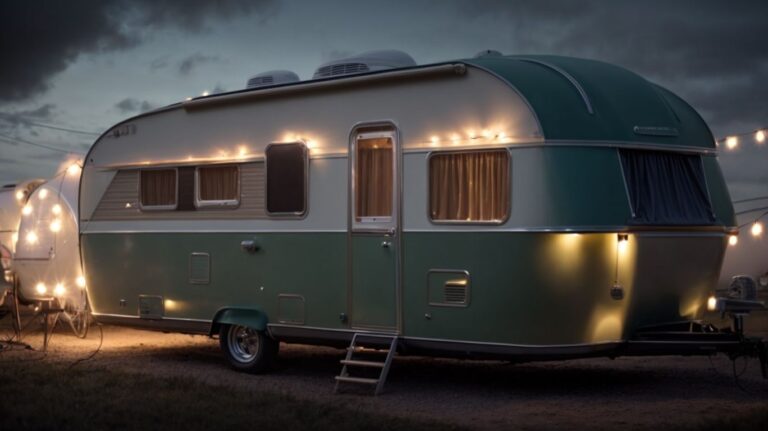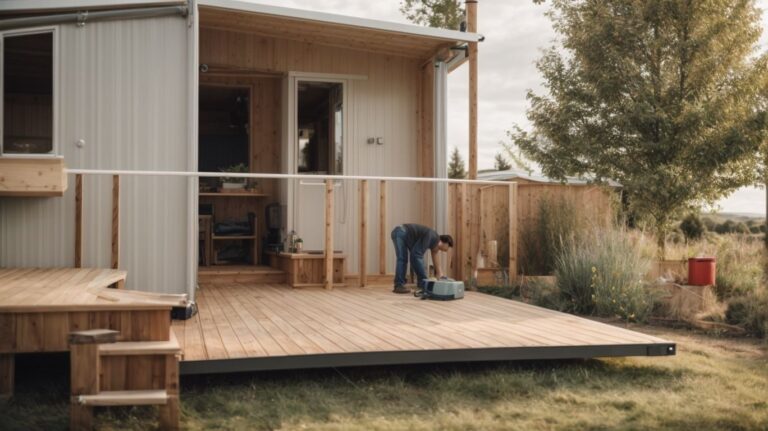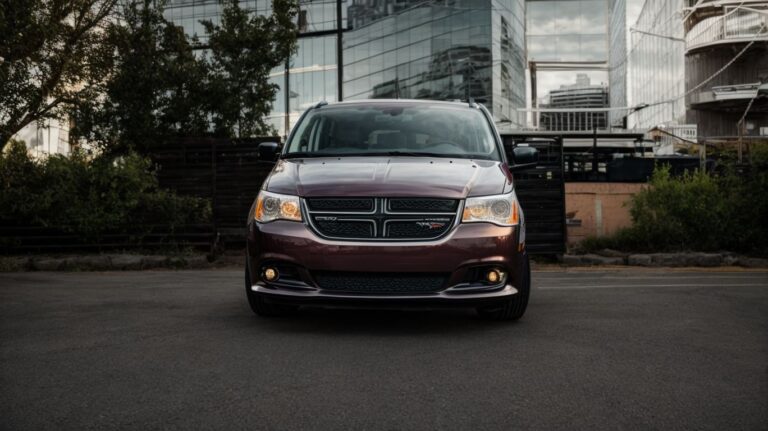Harnessing Solar Power: Understanding How Solar Panels Work for Caravans
Curious about how solar power works for caravans?
We’ll delve into the world of solar panels and explore their various types.
Discover the benefits of using solar power for caravans and learn about the factors to consider before installation.
From understanding the components of a solar power system to maximizing energy conservation tips, we’ve got you covered.
Say goodbye to common misconceptions and embrace the sustainability of solar power for your caravan adventures.
Key Takeaways:
What Is Solar Power and How Does It Work?
Solar power is a renewable energy system that harnesses sunlight to generate electricity through the use of solar panels.
When sunlight hits the solar panels, the photovoltaic cells within the panels get activated. These cells are made of semiconductor materials which release electrons when exposed to sunlight. The movement of these electrons creates an electric current that is then captured and converted into usable electricity. The more sunlight that reaches the panels, the more energy is produced.
The key component in this process is the inverter, which converts the direct current (DC) electricity generated by the panels into alternating current (AC) electricity that can power household appliances. The entire solar power system operates silently, efficiently, and without producing any greenhouse gas emissions, making it an environmentally friendly option for generating electricity.
Motion Activated RV Step Lights, 10 LED Battery Operated Motorhome Motion Sensor led Light Strip, Magnetic Night Light Bar for Motorhome Travel,Travel Trailers, Camper (2 Pack)
- 【Infrared Induction Motion Detection】Motion sensor light on the PIR sensor can detect human movement, 10 feet once your approach is detected, the rv step lights will automatically turn on in the dark, in the absence of detected motion or other light sources, 18 seconds after the automatic shutdown, a large degree of power savings and improved durability.
Camco TST MAX RV Toilet Treatment Drop-INs - Control Unwanted Odors & Break Down Waste and Tissue - Safe Septic Tank Treatment - Orange Scent, 30-Pack (41183)
- Toilet Deodorizer With Reactive Odor-Eliminating Technology: Experience a powerful RV odor eliminator that stops RV black tank odors for up to 7 days. Just (1) toilet drop in treats camper toilets with up to a 40-gallon tank.
THANSTAR Collapsible Dish Drying Rack Portable Dinnerware Drainer Organizer for Kitchen RV Campers Travel Trailer Space Saving Kitchen Storage Tray
- 【Food Grade Material】Made from eco-friendly PP+TPR material that is BPA Free and Food-Grade. The flexible material allows the dish strainers for kitchen counter to collapse flat for easy space-saving and storage, making the most of your kitchen countertop.
Camco RhinoFLEX 20-Ft RV Sewer Hose Kit - Features Clear Elbow Fitting w/Removable 4-in-1 Adapter - Connects to 3” Slip or 3”/3.5”/4” NPT Threaded Sewer Connection (39742)
- Superior RV Tank Dumping: Streamline RV holding tank dumping with Camco’s RhinoFLEX 20' Camper Sewer Hose Kit. Built tough & flexible, this all-inclusive RV septic hose system provides simple & effective tank dumping on your camping adventures.
Camco Tastepure RV Water Filter - New & Advanced RV Inline Water Filter with Flexible Hose Protector - GAC & KDF Water Filter - Made in USA - Camping Essentials for Fresh Drinking Water (40043)
- Advanced 6-Step Filtration Technology: Experience the extraordinary power of Hex-Flow Technology & its remarkable 6-step filtration process. Every layer works together to provide you with water that is exceptionally clean.





What Are Solar Panels?
Solar panels are devices that convert sunlight into electricity by utilizing photovoltaic cells to capture and harness the sun’s energy.
These photovoltaic cells are typically made of crystalline silicon, which is a semiconductor material capable of generating electricity when exposed to sunlight. When sunlight hits the solar panels, the photovoltaic cells absorb the energy, causing the electrons to become active and creating an electric charge.
This charge is then directed through the internal wiring of the solar panel, where it is collected and converted into usable power. The generated electricity can either be stored in a battery for later use or fed directly into the electrical grid for immediate consumption.
What Are the Different Types of Solar Panels?
There are various types of solar panels available, including monocrystalline and polycrystalline panels, each offering different levels of efficiency and performance.
Monocrystalline solar panels are made from single-crystal silicon, making them highly efficient due to their uniform structure that allows electrons to flow easily. On the other hand, polycrystalline panels are made from multiple silicon fragments, which can result in slightly lower efficiency but are more cost-effective.
In terms of durability, monocrystalline panels tend to last longer and perform better in high temperatures, whereas polycrystalline panels may degrade faster in extreme conditions. The choice between these two types depends on factors like budget, space availability, and energy requirements for specific applications in solar systems.
How Can Solar Power Be Used for Caravans?
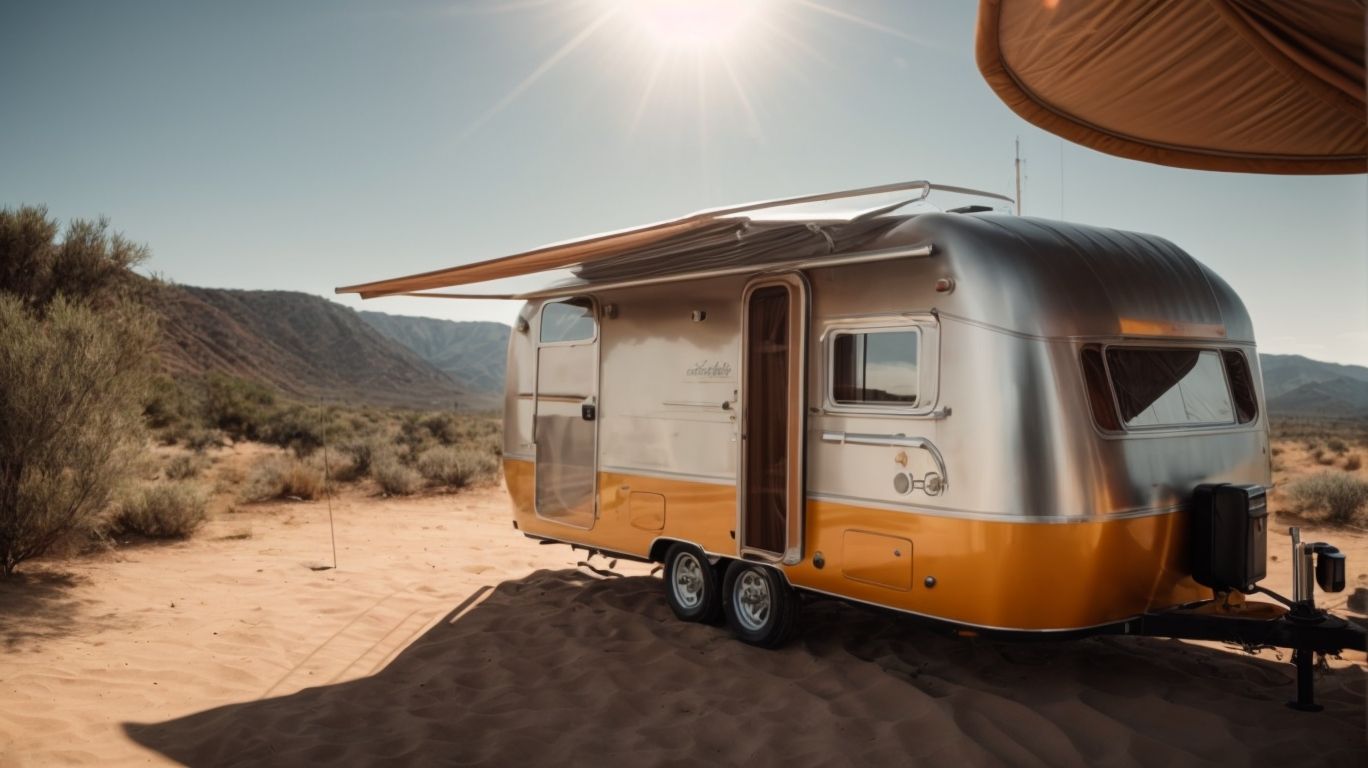
Credits: Motorcaravanning.Com – Alan Adams
Solar power can be effectively utilized for caravans to provide an off-grid power setup, allowing for independence and sustainable energy generation while on the move.





One of the primary advantages of incorporating solar power in caravan setups is the remarkable convenience it offers. With a reliable off-grid system, caravan owners can avoid the limitations of traditional power sources and freely explore remote locations without worrying about power availability.
The key component that enhances this off-grid capability is the Jackery Solar Generator, which efficiently harnesses solar energy to charge batteries and power essential appliances. This generator serves as a compact yet powerful solution, ensuring a continuous flow of electricity for lights, gadgets, refrigerators, and other necessary devices.
The flexibility of solar-powered caravans allows for unhindered exploration and extended stays in beautiful natural settings. Carrying a light and portable solar panel setup can easily provide the necessary power boost to keep your caravan operating efficiently, ensuring a comfortable and eco-friendly travel experience.
What Are the Benefits of Using Solar Power for Caravans?
The benefits of using solar power for caravans are manifold, including access to sustainable solar energy, independence from traditional power sources, and the ability to power essential appliances on the go.
One of the key advantages of incorporating a solar system into a caravan setup is the aspect of energy independence it offers. By leveraging the capabilities of the sun, caravan travelers can reduce their reliance on external power grids or generators, allowing them to explore remote locations without worrying about access to electricity.
The environmental benefits of utilizing solar energy cannot be overstated. Solar power is a clean and renewable energy source, which helps reduce carbon emissions and environmental impact compared to traditional fossil fuels. This eco-friendly approach aligns with the growing movement towards sustainable living and minimizes the ecological footprint of caravan travels.
What Are the Factors to Consider Before Installing Solar Panels on a Caravan?
Before installing solar panels on a caravan, consider factors such as the available roof space, the capacity of the leisure battery, the type of charge controller needed, and the compatibility with the existing power system.
Ensuring that the roof space can accommodate the solar panels is crucial, as the size and layout will impact the efficiency of the installation.
Evaluating the battery capacity is essential to store the generated energy effectively.
The selection of the appropriate charge controller is important to regulate the flow of energy and protect the battery from overcharging.





Integrating the solar panel system with the caravan’s existing power setup requires careful planning to optimize performance and ensure seamless operation.
How Do Solar Panels Work for Caravans?
Solar panels for caravans operate by capturing sunlight through photovoltaic cells, converting it into electrical energy, storing it in a battery system, and then using an inverter to power appliances.
Once the sunlight hits the solar panels on the caravan’s roof, the photovoltaic cells spring into action, generating direct current (DC) electricity. This electricity flows into the batteries, where it is stored to ensure a constant power supply. The critical role of the battery system is evident when the sun sets or during cloudy days, providing a reservoir of energy to keep the caravan running smoothly. The inverter then transforms this stored energy from DC to alternating current (AC), allowing it to power various appliances onboard.
What Are the Components of a Solar Power System for a Caravan?
A solar power system for a caravan consists of essential components such as solar panels, a charge controller, a leisure battery, an inverter, and wiring to connect the system for efficient energy generation.
Solar panels are the heart of the system, converting sunlight into electricity through photovoltaic cells. The charge controller regulates the power flow from the panels to prevent overcharging the battery. The leisure battery stores the generated electricity for later use, providing a reliable power source. An inverter transforms the stored DC power into AC power, compatible with most electronic devices. Efficient wiring ensures seamless connectivity among the components, optimizing energy transfer and distribution within the caravan solar setup. A well-integrated system maximizes energy production and utilization, enhancing the caravan’s self-sufficiency on the road.
What Is the Process of Installing Solar Panels on a Caravan?
The installation process of solar panels on a caravan involves mounting the panels securely on the roof, ensuring proper wattage calculations for energy needs, wiring the system efficiently, and testing the setup for optimal performance.
Regarding mounting the solar panels, it is crucial to select a suitable location on the caravan’s roof that receives maximum sunlight exposure throughout the day. Properly affixing the panels with strong brackets or mounts ensures stability during travel. Calculating the wattage requirement involves assessing the energy consumption of appliances and devices that will be powered by the solar system, influencing the number and size of panels needed.
Wiring the system involves connecting the panels in series or parallel, depending on the setup, to optimize energy production. Properly securing and insulating the wires is essential to prevent any electrical hazards or inefficiencies. After installation, a thorough testing process should be conducted to ensure all components are functioning correctly. This includes checking voltage outputs, monitoring charges to the battery system, and verifying that the system can power the caravan efficiently.
What Are the Maintenance Requirements for Solar Panels on a Caravan?
Maintaining solar panels on a caravan involves regular cleaning to ensure optimal sunlight absorption, monitoring battery levels for efficient energy storage, and inspecting wiring connections for safety and performance.
Regularly cleaning the solar panels on a caravan involves removing any dust, debris, or bird droppings that can obstruct sunlight penetration. This upkeep is crucial for maximizing energy production.





Keeping a close eye on battery levels is essential to prevent power disruptions while on the road. Proper battery management ensures that the caravan has a reliable energy source for running appliances and electronics.
Checking the wiring connections regularly helps in identifying any potential safety hazards or performance issues, ensuring a smooth flow of electricity.
Utilizing energy-efficient appliances can further optimize the usage of solar energy and increase independence from external power sources.
What Are the Common Misconceptions About Solar Panels for Caravans?
There are several common misconceptions about solar panels for caravans, including beliefs that they only work in sunny weather, require extensive maintenance, and are costly to install.
Contrary to popular belief, solar panels for caravans can still generate power on cloudy days, albeit at a slightly reduced efficiency. Advances in technology have made them more adaptable to varying weather conditions, ensuring a steady power supply even during overcast days. The maintenance requirements for these panels are minimal, with simple cleaning procedures and occasional checks being sufficient to keep them functioning optimally.
Another misconception is the high cost associated with installing a solar power system on a caravan. In reality, the initial investment can be offset by long-term savings on electricity bills, making it a cost-effective and eco-friendly choice for avid travelers.
Do Solar Panels Only Work in Sunny Weather?
Contrary to common belief, solar panels can still generate energy even in cloudy or overcast conditions, allowing for a continuous power supply, especially in off-grid settings.
This remarkable capability is due to the way solar panels harness sunlight. While direct sunlight is optimal for maximum energy production, solar panels can still generate electricity even on cloudy days. They work by converting sunlight into electricity through photovoltaic cells. These cells absorb photons from sunlight, creating an electric current that can be used to power homes, businesses, or any electrical device. This means that even in areas with less sunlight or during inclement weather, solar panels continue to provide a reliable source of energy.
Do Solar Panels Require a Lot of Maintenance?
While solar panels do require some maintenance, such as periodic cleaning and checking system components, the overall upkeep is minimal compared to the long-term benefits they provide in energy savings and efficiency.
Cleaning the solar panels is essential to ensure they operate efficiently by maximizing sunlight absorption. Regularly clearing debris, dust, and dirt can significantly improve energy production.





Performing system checks helps identify any issues early, preventing potential damage and ensuring the smooth functioning of the solar battery. By staying proactive with these maintenance tasks, homeowners can prolong the lifespan of their solar panels and enjoy uninterrupted energy savings with minimal effort.
Are Solar Panels Expensive to Install?
The cost of installing solar panels varies depending on factors such as the type of panels chosen, the installation method (portable or mounted), and the overall power capacity required for the caravan.
Regarding the pricing considerations of solar panel installations for caravans, the type of panels is a significant cost influencer. Monocrystalline panels, known for their high efficiency, typically come at a higher price point compared to polycrystalline or thin-film alternatives. The method of installation plays a crucial role in determining costs. Portable solar panel setups offer flexibility but may require more frequent adjustments and maintenance, potentially impacting overall expenses.
How Can You Maximize the Use of Solar Power for Your Caravan?
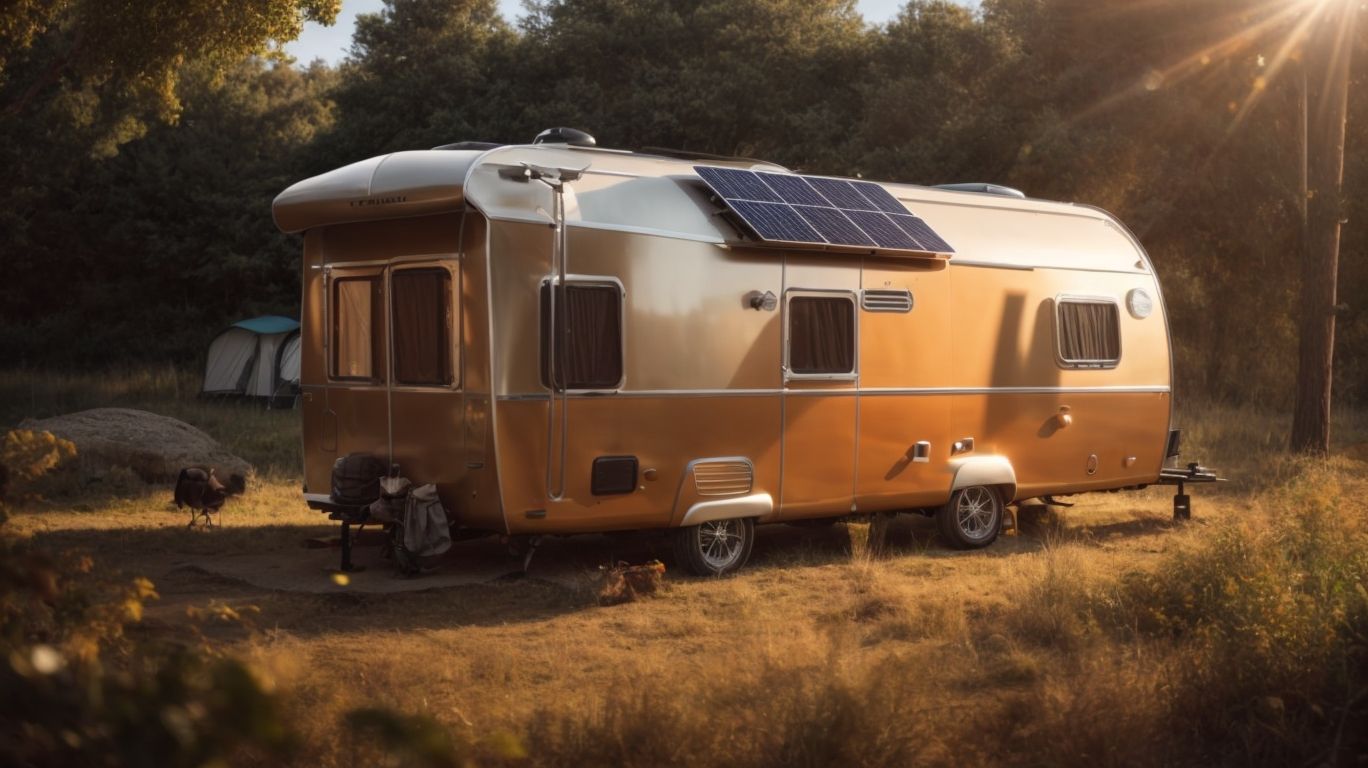
Credits: Motorcaravanning.Com – Nicholas Walker
To optimize the use of solar power for your caravan, focus on efficient energy management, proper utilization of a charge controller, and maintaining a balance between power consumption and energy supply to enhance overall efficiency.
One crucial aspect of maximizing solar power in caravan setups is to invest in high-quality solar panels that are capable of efficient energy conversion. Ensuring that your panels are positioned correctly to capture the maximum amount of sunlight throughout the day is essential for harnessing optimal power. Incorporating a reliable charge controller can prevent overcharging and optimize the charging process, prolonging the lifespan of your battery.
What Are Some Tips for Conserving Energy While Using Solar Power?
Conserving energy while leveraging solar power involves using energy-efficient appliances, minimizing power wastage, optimizing charge controller settings, and being mindful of power consumption habits to ensure a sustainable and efficient energy supply.
Regarding appliance efficiency in a solar-powered setup, selecting energy-efficient appliances and maintaining them properly can make a significant difference. Ensure that your refrigerator, air conditioner, and other electrical devices are designed to consume less power. Regular maintenance such as cleaning filters and coils can help them run more efficiently. Reduce power wastage by turning off lights and unplugging devices when not in use, as even standby mode can draw power.





Frequently Asked Questions
How do solar panels work for caravans?
Solar panels use photovoltaic cells to convert sunlight into electricity, which can then be used to power your caravan’s appliances and electronics.
What are the benefits of harnessing solar power for caravans?
Solar power is a renewable and sustainable energy source, meaning it is better for the environment and can save you money on traditional power sources. It also allows for greater flexibility and independence when traveling.
How much solar power do I need for my caravan?
The amount of solar power needed depends on the size and energy consumption of your caravan. On average, a small caravan will need around 100-200 watts of solar panels, while a larger one may require 300-500 watts.
Can I store excess solar power for later use?
Yes, you can store excess solar power in batteries for later use. This is especially useful when traveling to areas with limited sunlight or during nighttime when solar panels are not actively producing electricity.
What maintenance is required for solar panels on caravans?
Solar panels on caravans require very little maintenance. You may need to occasionally clean them to remove any dirt or debris that may be blocking sunlight. It is also important to regularly check the wiring and connections for any damage.
Can I use solar power to run air conditioning in my caravan?
Solar power alone may not be enough to run air conditioning in your caravan, as it requires a large amount of energy. However, you can use solar power to supplement your caravan’s battery, which can then power the air conditioning system.
